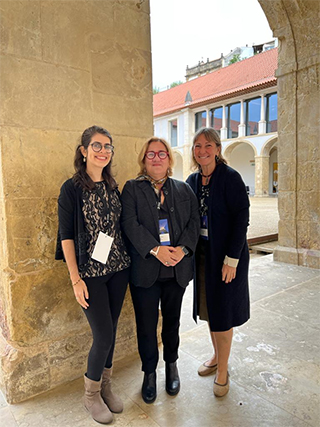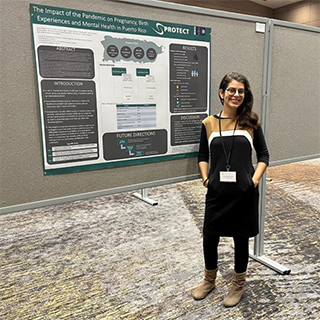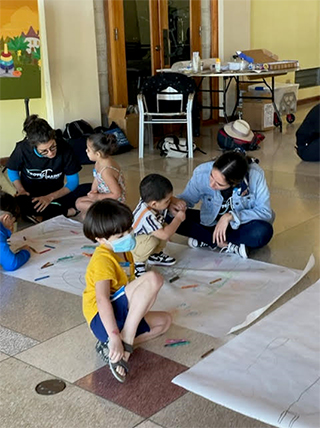By Julie Leibach

In 2018, Irene Lafarga Previdi, Ph.D., accepted her dream job as community engagement coordinator at the University of Puerto Rico's Center for Collaborative Research in Health Disparities (CCRHD). As a social psychologist, Lafarga Previdi studies factors that affect community health and well-being, so the role was a natural fit.
"It was what I envisioned doing professionally - being in academia but also working with communities," Lafarga Previdi said.
Pivotal academic and extracurricular experiences shaped her path. During graduate school at the University of Puerto Rico, Lafarga Previdi volunteered with adult literacy programs locally and in an Indigenous community in Guatemala. She also assisted the University of Puerto Rico at Rio Piedras campus with surveys designed to help communities to identify, prioritize, and address various needs.
"That work gave me a sense of how to interact with communities and make them part of the research process in terms of reporting back research results," she said.
Lafarga Previdi is also a postdoctoral trainee with the Puerto Rico Testsite for Exploring Contamination Threats (PROTECT) , a multi-institutional center funded by the NIEHS Superfund Research Program (SRP). Since 2010, the center has been studying the effects of environmental exposures on pregnant women and birth outcomes.
Her dual appointments allow Lafarga Previdi to learn and lead alike, according to her mentor, Carmen Milagros Velez Vega, Ph.D.
"In one center, she's a coordinator, and in the other, she's a trainee," said Velez Vega, who is director of community engagement at CCRHD and PROTECT. "Because of her educational experience, Irene also supports the development of younger trainees."
Getting Personal
On September 20, 2017, Puerto Ricans were still reeling from Hurricane Irma when Hurricane Maria blasted across the island . The category 4 storm decimated the power grid, plunging the island into a blackout that lasted months, and nearly a year for some homes.
As an NIEHS postdoctoral trainee, one of Lafarga Previdi's first big projects was to understand how mothers and pregnant women experienced the hurricanes . Specifically, she curated answers to a free-response question appearing at the end of a health survey distributed to PROTECT participants.

The analysis, published in 2022, uncovered several themes among the 76 replies, including pregnancy and birth challenges, lack of access to basic services, and concerns about health and about children's well-being, among other topics.
"Sadly, I wasn't too surprised with their answers, because I lived through the hurricanes and also experienced the lack of basic resources," Lafarga Previdi said.
However, responses also revealed greater awareness of environmental exposures - an outcome that Velez Vega attributes to PROTECT's established community engagement practice.
"People knew that the water wasn't safe to drink and that there was a big problem with air pollution created by all the generators that were operating at the same time," Velez Vega said. "Because we've been working with this population for over 10 years, I think that there has been a growing consciousness in terms of the health effects of natural disasters and associated environmental exposures."
Survey replies also pointed to another phenomenon that emerged during the aftermath: People coped through social interaction.
A Model of Success
Early in the pandemic, CCRHD funded several small grants to community organizations. The aim was to foster short-term projects designed to mitigate health disparities either caused or exacerbated by the public health crisis. Early on, grantees requested monthly meetings with CCHRD so they could share their progress and discuss challenges.
"The monthly meetings became a kind of support network between the grantees and us. They really fostered a sense of community," Lafarga Previdi said.
The meetings also taught participants how to leverage their efforts for additional funding. For example, extra support enabled one grantee - a woman-owned organization based in the mountains - to develop an educational curriculum for community health workers, and even to conduct the first round of trainings.
Although mini-grant funding has since ended, Lafarga Previdi and her colleagues at CCHRD maintain relationships with the grantees. As the center develops the next round of mini-grant opportunities, Lafarga Previdi plans to integrate monthly meetings into the framework.
"They help us build trust and rapport with communities," she said.
"One participant said that they were able to know their neighbors. Because there was no electricity, no Wi-Fi, no anything, they had to get out of their house and meet people and rely on them," Lafarga Previdi recalled. "That social support was key to them surviving and being able to heal from the storms and move forward."
Lafarga Previdi and Velez Vega are now analyzing data from a related study, funded by the National Institute of Minority Health and Health Disparities, to explore the effects of the COVID-19 pandemic on PROTECT participants. Ultimately, they plan to compare the study findings with their hurricane data.
Although results are preliminary, a key difference in coping strategies has emerged.
"Social support was easier after the hurricanes because people were able to gather, whereas with the pandemic, social distancing inhibited that ability," Lafarga Previdi said. "Participants had Zoom or phone calls, but it wasn't the same as having people visit them, particularly during the postpartum period. And that had a negative impact on their mental health."
"This is a culture that's very family oriented, very gregarious," added Velez Vega. "So being alone was hard for many people."
The observation has inspired Lafarga Previdi to explore new ways to meet social needs during public health crises.
"We would like to delve deeper into providing recommendations for interventions. We don't know when the next hurricane or pandemic is going to hit, so we need to be prepared" she said. "We can learn from these experiences and do better next time around."
On the Same Page

As community engagement coordinator at CCRHD, Lafarga Previdi is a liaison between scientists and the public. But translating research - especially topics outside her expertise - is not always easy, she said.
"Sometimes the challenge is in understanding these projects, but success is in the investigators' willingness to meet us halfway," Lafarga Previdi said. "I think there is a lot of humility on both parts, where we just find a way to work together in a common language."
"In Puerto Rico, a lot of people participate in research, and they like to do so because there is a sense of contributing to a greater good - but they need to understand the projects," Velez Vega added.
Given that CCRHD's community engagement program launched a year before she was hired, Lafarga Previdi looks to PROTECT's tradition of reporting results back to communities as a model.
"We're at the beginning of a new grant cycle at CCRHD, so we're meeting with researchers earlier in the process to ensure that we can do individualized development plans for each project," Lafarga Previdi explained. "We want them to consider community engagement not only toward the end, when we share results, but throughout."

